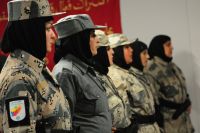CAMP MIKE SPANN, Afghanistan – Twenty three women graduated from the Afghan National Police Women’s Policeman’s training course at the ANP Regional Training Center in Mazar-e-Sharif in a ceremony Nov. 24.
The eight-week course is designed to lead female trainees to a level of competence and professionalism in all aspects of police activities.
During the course, the women received training in hand-to-hand combat, basic patrol practices, explosives identification, first aid, and post explosion procedures, as well as instruction on the use of force and lessons on the constitution.
“These police women have been put through a curriculum which is practical in nature and covers police skills,” said French Gendarmerie Lt. Col. Didier Rahmani, RTC-MeS commander. “They have demonstrated that they are flexible and adaptable and will be able to accomplish any task assigned to them.”
The training was conducted by coalition police trainers who aimed to give the students two fundamental qualities; a thorough knowledge of the processes and reactions necessary for a complete understanding of a given situation, and the ability to act decisively under pressure.
“Thanks to their training, these police women will be well prepared to accomplish their mission and perform in grueling conditions, both physically and psychologically,” Rahmani said.
The women attending the class were already employed by the ANP and the Afghan Border Police, but had yet to receive any formal training and were filling support roles.
After receiving this training, as members of the first womens course at RTC-MeS, they will be able to assist in any situation that requires female interaction.
“Women are so important to the law enforcement mission,” said Andrea Navar, WPC advisor. “They are necessary in search procedures, but can also bring gentleness to police operations so victims may feel more willing to cooperate.”
According to their trainers, the women took to the material with real drive and dedication; however there were hurdles that each woman had to overcome.
“There were a lot of cultural differences between the women from different tribes,” Navar said. “There were also issues with literacy and the fact some of the trainers were male.”
Courses were offered to help improve the literacy rate and by the end of the class each woman could read the Dari slides that were presented in class. They also learned that to be successful, they needed to work together.
“As time went by, the ladies learned to accept each other,” Navar said. “They realized that they all belong to one country.”
By Air Force Master Sgt. Kristina Newton
Regional Support Command-North/NTM‑A Public Affairs
Source:
Allied Command Operations
NATO

 von
von 